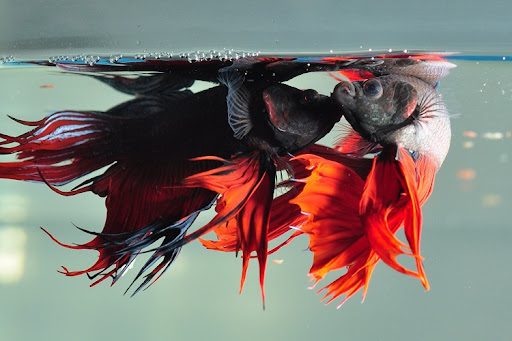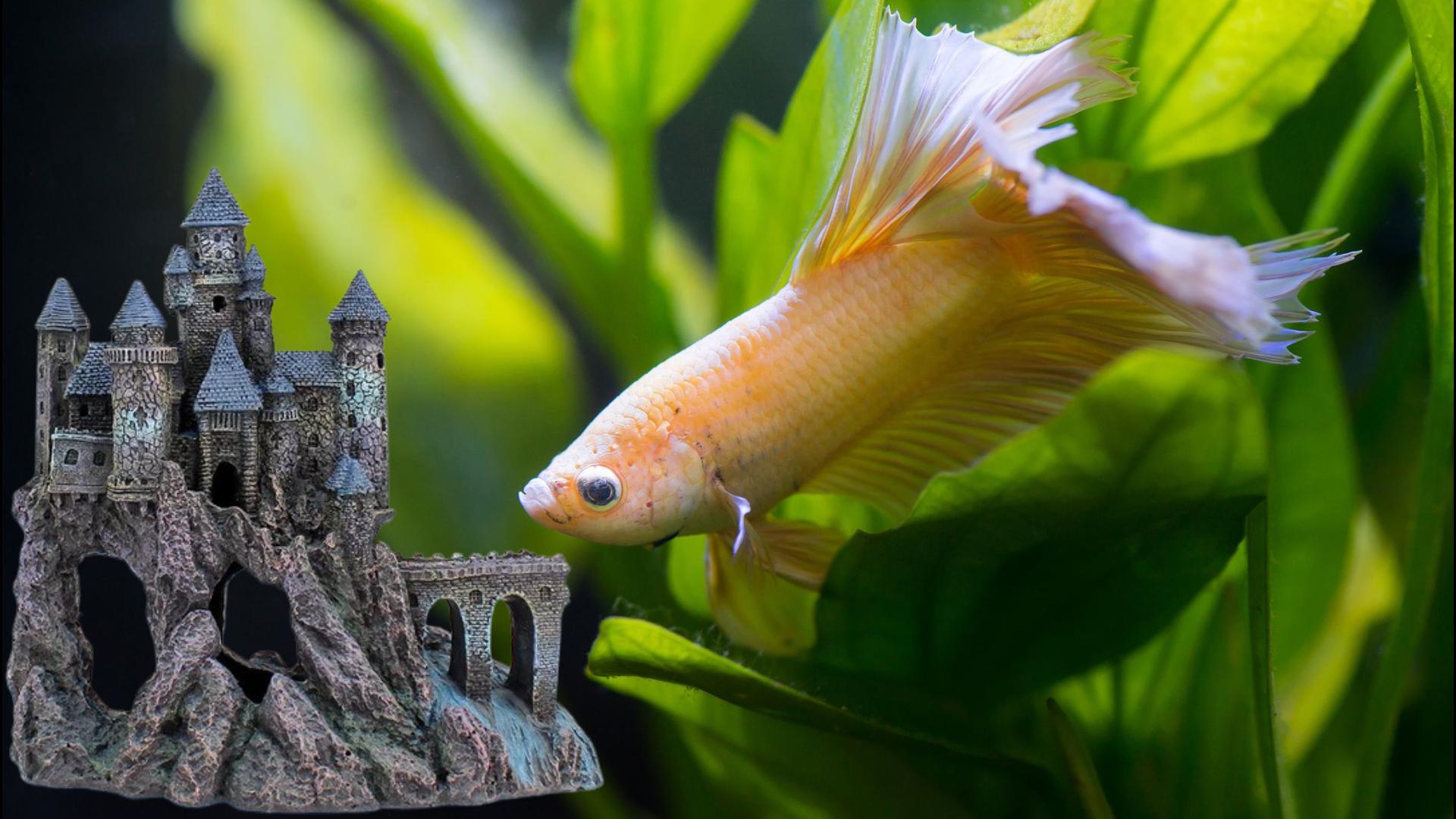Why do betta fish fight? Do they fight until death? How do you recognize it? How to know betta fish fight is about to begin? Do males fight females? Is it true that betta attacks other fish types? What can be done to stop them from fighting? If any of these questions trouble you, you’re in the right place. All these questions will be answered in this blog. Keep watching till the end.
There is a history behind the reason why Betta fish are so aggressive. Betta fish were originally brought back to local Asian towns by those working in rice paddies and puddles. The aggressive nature of betta fish led to keepers fighting, betting on matches, and specifically breeding them to be more aggressive. This genetic aggression of betta fish still exists today.
How to know, a betta fight is about to begin?
It is easy to tell when your Betta fish is fighting; hopefully, you will never have to see it! Betta fish first warn other fish by flaring their gills and spreading their fins in an attempt to make themselves look like a serious threat. This will also give the other male a chance to leave before a fight ensues. These warning signs will soon become a fight if the threat doesn’t leave.
Why do betta fight?
Male Betta fish fight each other because they are incredibly territorial. They build territories that they defend with their lives. A betta fish fights to keep their territory safe from trespassers. They’ll fight until the other guy gets hurt or gives up. The most common reasons that betta fish get aggressive are fighting for food, securing a bubble nest, stress, overcrowding, and intentional breeding.
How Do Betta Fight?

If flaring their gills and spreading their fins do not help, the Betta fish fight will escalate to nipping. Males will circle each other, nipping at each other’s fins and tails. They will fight until one male backs off or dies. Betta fish fight primarily with their mouths. They bite the scales, fins, and bodies of other fish to hurt them. If you’re lucky enough to catch signs of aggression before a full-on fight starts, the best thing to do is separate them. Male Betta fish should never be kept together.
How Long Do Betta Fight?
In most cases, a Betta fish fight may last a couple of minutes or end immediately. Fights will last much longer in betta that has been selectively bred for aggression and usually end with one betta either very injured or dead. Reminder, This is animal cruelty and should never be done.
Do they really like to fight?
There is no evidence to prove whether betta fish like to fight. Aggressive behavior in fish is a natural instinct. They are naturally inclined to protect their territory just like any other animal. Fighting is generally stressful for fish, so they probably do not enjoy it. Animals fight because it is part of their instincts and how they live in the wild.
Do Betta fight each other to death?
Betta fish will not always fight to absolute death. Most of the time they won’t even get close to that point unless they’ve been selectively bred for aggression or are trapped in a small tank with nowhere for the less dominant Betta to hide. Betta fish often damage their opponents’ scales, gills, and tails by nipping and thrashing about. Those injuries, along with infections caused by stress, could kill a Betta after fighting. It is cruel to deliberately make betta fish fight.

Do they fight in the wild?
In the wild, Betta fish swim through miles of rivers and paddies during the dry season. It is very rare for fights to take place in the wild compared to aquariums. If one betta enters another’s territory and displays aggression, no fight will result since the other betta backs out and moves on. However, they have to either find or hunt for food to survive. In such situations, Betta fish are forced to fight in the wild for survival. Males also fight each other to protect their bubble nests and eggs. He will wait for a female to notice the bubble nest after he blows it. A threat to a bubble nest in the wild leads to a fight.
Do male betta fight against females?
There will also be fights between male and female Betta fish. Domestic male Betta fish don’t like having females in their tanks. They should never be housed together except during mating and separated immediately after. It’s common for females to eat eggs during spawning, so a male will chase them off and defend against this behavior. Males are the ones who place the eggs in the nest and care for them until hatching. They will do whatever it takes to protect their offspring.
Do two female betta fight?
It is generally possible to keep female Betta fish together. Compared to their male counterparts, they are less aggressive, but can still be territorial and aggressive toward each other. It’s advisable to have several females in a sorority tank and plenty of space for them. Some females may still be too aggressive for sorority life. If you are trying to keep female Betta fish together and you see signs of fighting, the aggressive fish must be separated. Never add a male to a sorority tank.

Are Betta fish aggressive towards other fish types?
If you keep Betta fish in a community tank, you should avoid any fish that has bright colors or long ornamental fins. There are Betta fish that are aggressive towards other fish, some of which would be fine with a few tankmates. If your aquarium is too crowded, it is highly likely that your Betta will act aggressively because there will not be enough territory for them. If you are planning to house Betta with other fish species, make sure there is plenty of space and hiding spots.
How to stop them from fighting?
One of the easiest ways to stop your fish from fighting is to only have one male fish per tank. Also provide a visual barrier between the two tanks so the fish cannot see each other at any time. If your betta fish jump over the separator or accidentally get in the same tank, separate them right away. Male Betta fish should never be kept together. Avoid mirrors and other shiny objects in the tank. Items like these in a tank can make it look more attractive to us, but they can also cause stress for fish. Betta can injure themselves if they attack mirrors ornaments toys and other shiny items around the tank. You can reduce fighting by giving them a lot of space, hiding places, and carefully choosing their tank mates.
Betta fish health and happiness are one of our primary responsibilities as pet keepers. So never intentionally fight a betta fish. It’s absolutely animal cruelty.
Now, let’s look at another common behavior and instinct of betta fish, jumping out of the tank. It’s common for Betta keepers to check their tanks first thing in the morning. Betta fish keepers’ worst nightmare is seeing their fish jump out of the tank and not noticing until it’s too late. This section talks about why betta fish jump out of the tank and the easy steps to prevent them. Let’s get into the detail
How high can betta fish jump?
Two to three inches above the surface of the water is the average height a Betta fish can reach. This is helpful information for Betta keepers to plan their tank setup accordingly to prevent jumping. It’s a good idea to keep the fish tank water 2 to 3 inches below the tank top to keep the fish from jumping out. I find female fish to be more adventurous than males. In general, female fish have shorter fins and swim faster. This also helps them jump higher. So if you have a bunch of female Betta fish in your aquarium, you must cover the tank with a lid.
Why Do Betta Fish Jump Out Of Their Tanks?
There are numerous reasons Betta fish can jump out of a tank. Here are some common reasons why your Betta fish might jump out of their tank.
Small tank size
You might have heard that betta fish can live in small tanks. It is not true. Smaller tanks are also the most common reason for betta fish to jump out of the tank. A more spacious tank will give your betta fish a better life. Ammonia levels will skyrocket quickly in smaller tanks which is very dangerous for your betta fish’s health.
Poor water conditions
Poor water quality in the tank could be one of the major reasons your Betta fish is jumping out. Aquarium water gets dirty after a few days based on your tank setup. If the water is not changed regularly, it becomes harmful to your Betta fish. If your Betta fish don’t like such poor water conditions, they may jump out of the aquarium. You can keep your tank’s water quality high by cleaning it regularly.
Poor sleep cycle
Just like humans, Betta fish have a sleep cycle that’s crucial to their health. A bad sleep cycle can make your fish frustrated and restless. This affects his eating habits too since he doesn’t know when to stay awake and when to fall asleep. Sleep is critical for your fish because it gives it enough rest and keeps it stress-free. You can improve their sleep cycle by keeping the tank’s lighting right and not disturbing them at night.
Something interesting outside the tank
If your Betta fish discovers that flies are hovering around, it is likely to jump and try to catch them. This is uncommon behavior but it could be one of the reasons your fish is jumping out of the tank. Betta fish are known for trying anything they see as food. Betta fish are also often scared by sudden noises or unexpected activity around the tank that makes them jump out of the tank.
Bully fishes in your tank
Don’t make the mistake of putting two male Betta fish together. They may just kill each other with their aggression. Also don’t ever consider fish such as fin nippers like tiger barb, and large predatory fish which are dangerous for betta fish. If you have any bully fish in your tank, your betta fish may get stressed and look for a way to escape by jumping. See the bully fish blog on my channel to avoid them.
Cold water
Betta fish prefer a temperature between 78 and 82 degrees Fahrenheit in their tank. It’s common to see betta fish jump out of their tanks when the temperature is low. So, keeping the tank temperature at the right level is critical for betta fish.
How do you prevent Betta from jumping out?
It’s easy to stop betta fish from jumping out of their tanks by keeping your tank environment healthy and safe by following a few steps.

Right aquarium setup
Keep your Betta fish tank size optimal for your fish. Betta fish tanks should be a minimum of 5 gallons, but bigger is always better. Betta fishes are habitual to tropical environments so keep the water neither too cold nor too hot.
Heater and filter
Don’t forget a heater in your aquarium. This will keep Betta healthy and happy. Install a heating device and maintain a specific water temperature. This helps prevent Betta from jumping. The ideal temperature should be between 78 and 82 degrees. Also, a filter will keep the tank clean by absorbing all waste and dirt.
Add a lid to the tank – Prevent Betta Fish Jump
Aquarium lids are one of the most common solutions for countering betta fish jumping. Several stylish aquariums with lids are available. You can also try a homemade lid in case you don’t like any lids available on the market. Maintain the water level of your aquarium below 3 inches from the topmost surface. This is a safe limit to maintain even when the aquarium has a tight lid on it.
Plants and accessories
Add some aquatic plants to reduce ammonia and nitrates. This would also give the fish a sense of security. You can also purchase live plants that can float on the water’s surface. The plants will act as an obstacle to jump over. It is healthy to keep plants with your betta in an aquarium. It can help to reduce the tendency of betta fish to jump out of the water.
Keep the water clean – Prevent Betta Fish Jump
Always conduct water tests to check if it’s clean or not. Be sure to check for ammonia, pH, and other chemicals such as nitrite. Regularly remove food waste and fish waste from the tank to keep it healthy. Don’t forget to clean your tank regularly as this will reduce the jumping habit of Betta fish. Cleaning will also keep all the chemicals under control. It’ll keep the betta fish healthy and stable and stop them from jumping out.
Say No to ammonia
Make sure there is no ammonia present in your tank. Ammonia slowly destroys the scales, gill plates, and fins of your betta fish. Another harmful chemical is Nitrite which prevents oxygen from getting outside the blood. Your betta fish gets sick most of the time because of nitrite and ammonia in the tank.
Hiding Places in the Tank – Prevent Betta Fish Jump
Betta fishes love hiding places, whether they’re under a leaf or in a cave. They like resting on the plants or decorating inside the aquarium. Plants also keep the water clean. This may sound like something small to you but helps Betts fish to stay safe and not go jumping around out of the water.
Take care of the lighting – Prevent Betta Fish Jump
Pay attention to your aquarium’s lighting. Lighting also affects Betta fish. Try and give at least 8 hours a day of light to Betta so he gets time to rest for the remaining hours. Lighting is also critical for keeping a positive circadian rhythm.
How to Save Bettas After Jumping Out of the Tank?

In case your betta jumps out of his tank, you’ll need to act quickly to keep him alive. It’s best to put him back in his tank right away if you catch him early enough. At this point, it’s not uncommon for your betta to just lay on the bottom of the tank. If he isn’t improving after 10 to 15 minutes, he might be having difficulty breathing because his gills have dried up. If this is the case then you should add some aquarium salt and start the treatment to improve his gill function.
Hope you find this blog helpful and get some ideas to prevent your Betta fish from jumping. Check this blog, if you want to know more insights on this betta fish jumping topic. Also, comment below, in case of any further questions.





